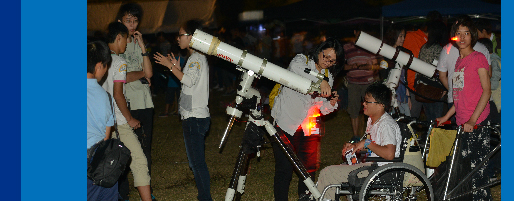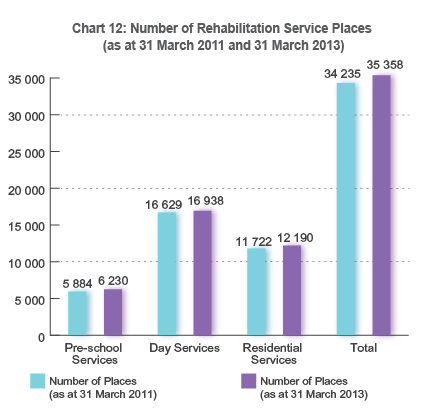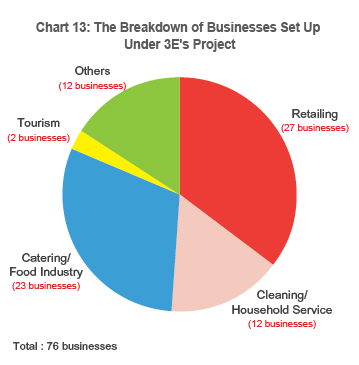
OBJECTIVES
8.1
Rehabilitation services aim at assisting persons with disabilities to become full members of the community by developing their physical, mental and social capabilities to the fullest possible extent and by promoting their integration into the community.
SERVICE PROVISION
8.2
To achieve the above aims, SWD, directly or through subvention to non-governmental organisations (NGOs), provides a full range of social rehabilitation services for persons with disabilities. At the end of March 2013, there were 6 230 pre-school places, 16 938 day places and
12 190 residential places. The breakdown of service places as at 31 March 2013 is shown in the table below while the number of rehabilitation service places as at 31 March 2011 and 31 March 2013 is shown in Chart 12.
| |
Places
|
|
Pre-school Services
|
|
|
Early Education and Training Centre
|
2 613
|
|
Special Child Care Centre
|
1 757
|
|
Integrated Programme in Kindergarten-cum-Child Care Centre
|
1 860
|
|
Sub-total
|
6 230
|
|
Day Services
|
|
|
Day Activity Centre
|
4 801
|
|
Sheltered Workshop
|
5 051
|
|
Supported Employment
|
1 633
|
|
Integrated Vocational Rehabilitation Services Centre
|
4 257
|
|
Integrated Vocational Training Centre (Day Service)
|
453
|
|
On the Job Training Programme for People with Disabilities
|
432
|
|
Sunnyway - On the Job Training Programme for Young People with Disabilities
|
311
|
|
Sub-total
|
16 938
|
|
Residential Services
|
|
|
Residential Special Child Care Centre
|
110
|
|
Long Stay Care Home
|
1 507
|
|
Halfway House
|
1 509
|
|
Hostel for Moderately Mentally Handicapped Persons
|
2 292
|
|
Hostel for Severely Mentally Handicapped Persons
|
3 382
|
|
Care and Attention Home for Severely Disabled Persons
|
959
|
|
Hostel for Severely Physically Handicapped Persons
|
573
|
|
Care and Attention Home for the Aged Blind
|
825
|
|
Supported Hostel
|
554
|
|
Small Group Home for Mildly Handicapped Children
|
64
|
|
Integrated Vocational Training Centre (Residential Service)
|
170
|
|
Pilot Bought Place Scheme for Private Residential Care Homes for Persons with Disabilities
|
245
|
|
Sub-total
|
12 190
|
|
Grand Total
|
35 358
|

HIGHLIGHTS OF THE PERIOD
New Provisions of Facilities and Initiatives
8.3
To meet the demand for services, 1 123 new places were added in 2011-12 and 2012-13 including 346 places for pre-school services, 309 places for day services and 468 places for residential services.
District Support Centre for Persons with Disabilities
8.4
To strengthen the support to persons with disabilities and their families who are living in the community, SWD set up 16 District Support Centres for Persons with Disabilities (DSCs/PWD) in January 2009 through re-engineering of home-based training and support service. As at 31 March 2013, 10 DSCs commenced centre service at their permanent accommodation, and another one is expected to commence service in its permanent accommodation in 2013-14 upon completion of fitting-out works. SWD has also identified premises for four DSCs at new development projects. SWD will closely monitor the progress and continue to identify suitable premises for the remaining DSC.
Pilot Scheme on Home Care Service for Persons with Severe Disabilities
8.5
Given the conditions of persons with severe physical and/or intellectual disabilities and the level and intensity of care they require, SWD is mindful of their special caring needs and the immense pressure faced by their family members in caring for them at home. To strengthen the support for this vulnerable group, SWD has secured funding under the Lotteries Fund to implement a three-year Pilot Scheme on Home Care Service for Persons with Severe Disabilities (the Scheme). The Scheme provides those who are living in the community and on the waiting lists for subvented residential care services with a package of home-based services to meet their care, nursing and rehabilitation training needs. The Scheme was first launched in Tuen Mun and Kwun Tong Districts in March 2011 and extended to Kwai Tsing and Wong Tai Sin Districts in September 2011.
Integrated Community Centre for Mental Wellness
8.6
In October 2010, SWD revamped the existing community mental health support services to set up Integrated Community Centres for Mental Wellness (ICCMW) in the territory through 24 service points. ICCMW aims at providing one-stop, district-based and accessible community support and social rehabilitation services ranging from early prevention to risk management for discharged mental patients, persons with suspected mental health problems, their families/carers and residents living in the serving district.
Community Care Fund Assistance Programme on “Training Subsidy for Children who are on the Waiting List of Subvented Pre-school Rehabilitation Services"
8.7
The Community Care Fund (CCF) implemented the above assistance programme in December 2011 with a view to providing training subsidy at a maximum of $2,500 a month for pre-school children from low-income families who are waitlisted for subvented rehabilitation services, thereby enabling them to receive self-financing services operated by NGOs and facilitating their learning and development. More than 1 600 children have benefited from the programme.
Promoting Self-reliance
Vocational Rehabilitation Service
8.8
In summary, the provisions to promote self-reliance for persons with disabilities through vocational rehabilitation services include:
-
12 137 places in Sheltered Workshop, Supported Employment, Integrated Vocational Rehabilitation Services Centre, Integrated Vocational Training Centre, On the Job Training Programme for People with Disabilities, and Sunnyway - On the Job Training Programme for Young People with Disabilities were provided for persons with disabilities as at 31 March 2013.
-
Through providing financial incentive for mentors, we encourage employers to arrange workplace mentors for employees with disabilities to facilitate them to adapt to the new work. The mentors will be allocated a one-off financial incentive of $500 after providing coaching to the employees with disabilities for at least one month. The scheme was implemented in December 2012.
-
The “Enhancing Employment of People with Disabilities through Small Enterprise” Project (3E's Project) aims at enhancing the employment of persons with disabilities through direct creation of jobs, providing seed money to NGOs to create small businesses with the condition of employing no less than 50% of persons with disabilities in the total number of persons on the pay-roll. To further enhance the employment of persons with disabilities, the government injected $100 million into the 3E’s Project in 2012. At the same time, to encourage more NGOs’ participation, SWD lowered the length of participation in welfare and charitable activities required for non-SWD-subvented NGOs from five years to two years, and extended the maximum funding period for individual business from two years to three years to allow more time for the funded businesses to gain operating experience and become self-sustainable. As at 31 March 2013, 76 businesses such as cleaning, bakery, eco-tourism, catering, car beauty, mobile massage, retail shops, vegetable supply and processing, traveling agency, etc. were set up through the support of the 3E's Project, creating over 820 employment opportunities, including more than 580 for persons with disabilities. The breakdown is shown in Chart 13 below:

Marketing Consultancy Office (Rehabilitation)
8.9
The objective of Marketing Consultancy Office (Rehabilitation) [MCO(R)] is to enhance employment and training opportunities for persons with disabilities through innovative, effective and efficient business development and marketing approaches. Services of the MCO(R) include assisting NGOs in the setting up of social enterprises and small businesses under the 3E's Project, promoting the products produced and services provided by persons with disabilities through the brand of SEPD (a registered trademark standing for “Support Employment of People with Disabilities”) and strengthening NGOs' cooperation with the government and private sectors.
Continuing Community Support
Regularisation of the Service of the Transitional Care and Support Center for Tetraplegic Patients
8.10
SWD set up the pilot Transitional Care and Support Centre for Tetraplegic Patients (TCSC) in 2008 to provide transitional residential service, ambulatory day training programme, residential respite service, social programmes and peer support groups for tetraplegic patients. Given the effectiveness of the service, the TCSC service was regularised in March 2013 to continue providing services for the needy users and relieving the caring stress of family carers.
Implementation of Assistance Programme under the Community Care Fund for Persons with Severe Disabilities
8.11
The CCF launched an assistance programme of “Special Care Subsidy for the Severely Disabled” in September 2011, with a view to providing persons with severe disabilities who are from families with financial difficulties, living in the community and requiring constant attendance with a monthly subsidy of $2,000, so as to render necessary support to them.
8.12
To address the special needs of persons with severe physical disabilities who need to use respiratory support medical equipment, the CCF launched another assistance programme in January 2013, namely “Special Subsidy to Persons with Severe Physical Disabilities for Renting Respiratory Support Medical Equipment” to provide persons with severe physical disabilities who are from families with financial difficulties, living in the community and not receiving CSSA, with a monthly special subsidy of $2,000 or $2,500 for a maximum period of 12 months for renting necessary respiratory support medical equipment.
Support to Persons with Disabilities Living in the Community
8.13
SWD has implemented a new package of three-year community-based support projects since January 2012. It aims at strengthening the caring capability of the carers to relieve their caring burden as well as improving the quality of living for persons with disabilities and their families. Projects funded under this package include home care service, home-based rehabilitation training service, personal development programme, specialised programmes for persons with autism and mentally handicapped persons with challenging behavior, support scheme for newly blind persons and on-the-job support service for disabled persons and their families.
Funding Support to Self-help Organisations
8.14
Funding support in an annual sum was provided to a total of 68 self-help organisations of persons with disabilities (SHOs) or their parents groups in 2012-14 to help the development of self-help organisations and to enhance the promotion of self-help spirit among persons with disabilities and their carers. To further strengthen the SHOs’ functions of providing support to persons with disabilities and their families/carers, a one-off special grants was allocated to 40 SHOs for launching carer-support programmes in 2011-12.
Licensing Scheme for Residential Care Homes for Persons with Disabilities
8.15
The Residential Care Homes (Persons with Disabilities) Ordinance (the Ordinance) (Cap. 613) has come into operation since 18 November 2011 [except Part 2 on sanctions for operating residential care homes for persons with disabilities (RCHDs) without licences or certificates of exemption (CoEs)], providing for the control of RCHDs through a licensing scheme administered by the Director of Social Welfare (DSW). To allow sufficient time for individual RCHDs to put in place suitable arrangements for application for a licence/CoE, there is a grace period of 18 months starting from the commencement of the Ordinance during which SWD will process the applications for licences/CoEs. CoEs are issued in respect of RCHDs that existed immediately preceding the commencement of the Ordinance but are not yet able to fully comply with the licensing requirements, so as to allow time for them to carry out improvements in compliance with the licensing requirements and standards.
8.16
SWD has established the Licensing Office of Residential Care Homes for Persons with Disabilities (LORCHD) upon the commencement of the Ordinance to perform the statutory duties in relation to the licensing scheme. The inspectorate teams of the LORCHD conduct regular inspections in respect of building safety, fire safety, health care and home management to ensure that RCHDs comply with the statutory requirements in staffing, space and layout, building structure, precautionary measures and quality of care, etc.
8.17
Complementary to the licensing scheme, SWD launched the four-year pilot Bought Place Scheme (BPS) for Private RCHDs in October 2010 which aims at encouraging private RCHDs to upgrade their service standards, increasing the supply of subsidised residential care places, thereby shortening the waiting time for subsidised residential service; and helping the market provide more service options for persons with disabilities. As at 31 March 2013, six private RCHDs had successfully joined the BPS, providing a total of 245 BPS places. The SWD also introduced the Financial Assistance Scheme for Private RCHDs in December 2011 to provide subsidies for private RCHDs to carry out improvement works in compliance with the licensing requirements in building and fire safety.
Information Technology for Persons with Disabilities in Need
Central Fund for Personal Computers
8.18
The Central Fund for Personal Computers was set up in 1997 to assist eligible persons with disabilities to acquire computer facilities for self-employment or receiving supported employment at home. As at 31 March 2013, the Fund had granted a total of $4.25 million to 336 applicants.
Jockey Club IT Scheme for People with Visual Impairment
8.19
The Jockey Club IT Scheme for People with Visual Impairment was set up under the auspices of the Hong Kong Jockey Club Charitable Trust in October 2005. The Scheme aims at supporting organisations to acquire high-performance Chinese screen readers and Braille displays for installation at communal access points to facilitate the access of persons with visual impairment (PVI) to IT, and to subsidise individual PVI with genuine financial difficulty to acquire these computer assistive devices for the purpose of studies or employment. As at 31 March 2013, 32 organisational applications and 134 individual applications were supported with $4.45 million committed.
Pursuing for Excellence
Hong Kong Paralympians Fund
8.20
The Hong Kong Paralympians Fund (HKPF) aims at fostering the development of sports for athletes with disabilities and to support their pursuit of sporting excellence in international events. In 2011-13, a total of $6 million was approved for allocation. Of the $6 million, $2.74 million was allocated to the sports associations for supporting their development of target sports, which included swimming, athletics, table-tennis, rowing, gymnastic, skating, badminton, boccia, shooting, wheelchair fencing and riding; $3.26 million to the athletes with disabilities for their pursuing of sporting excellence.





















